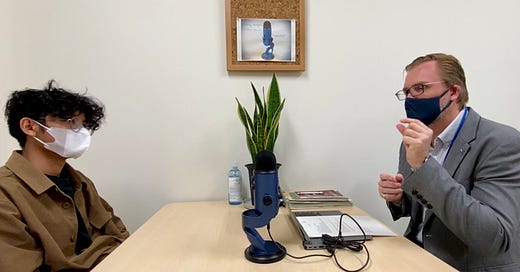Welcome to Season 2 of the Easy English Interviews Podcast! Season 2 will have some added content. In addition to the Podcast audio and the 10 comprehension questions that were included in each post of Season 1, Season 2 will include various Easy English Grammar, Usage, and Vocabulary Points. These will be one-point English lessons to look out for in each interview. Those will be included here in the podcast post and in the podcast audio. They will also be found in the textbook for Season 2, which will be available after the full season is released.
If you are new to the podcast, Season 1 is complete and there is a companion textbook for sale now on Amazon. It can be found by clicking the link below.
Easy English Interviews PodcastのSeason 2へようこそ! シーズン2には、いくつかのコンテンツが追加されます。シーズン1では、ポッドキャストの音声と各投稿に含まれていた10問の理解度チェックに加えて、シーズン2では様々なEasy English Grammar and Vocabulary Pointsが含まれます。これは、各インタビューで気をつけるべきワンポイントの英語レッスンです。このポッドキャストの記事と音声に収録されています。また、シーズン2のテキストにも掲載されます。
ポッドキャストを初めてご覧になる方は、シーズン1が終了し、付属のテキストブックがアマゾンで販売されています。以下のリンクをクリックしてください。
In November 2022, I had a great conversation with Haris, who is a student from Singapore, currently doing an internship in Nagano, Japan. He is interested in information technology. Here is that interview.
EASY ENGLISH GRAMMAR POINT for EPISODE #4
In today’s interview, please listen for when Saran and Kris use some common English sequencers. For example:
First, I will study English.
Next, I will study science.
Finally, I will take a break and relax.
EASY ENGLISH USAGE POINT for EPISODE #4
The second thing I would like to focus on in today’s interview is the use of the phrase, “I guess”. This is used when you are expressing something that you are not sure about. For example:
It’s cloudy this evening, I guess it will rain tomorrow.
or
You look tired, so you want to go to sleep, I guess.
So now, sit back, relax, and enjoy this interview with Haris.
COMPREHENSION QUESTIONS FOR EPISODE #4
What type of technology is Haris studying?
When will he be graduating?
What type of media does he enjoy consuming?
What time does Haris wake up in the morning?
What does Haris think is the worst thing about being in Japan?
Where was Haris going when he got lost in Japan?
How many courses did Kris take before he came to Japan?
For how long will Haris have to go back to his mandatory military service every year until he is 40?
If he can’t get into a local university in Singapore, what type of country would he like to try to study in?
When Haris went overseas for the first time, what was the first country he visited?
Thank you for listening and as always, please like or subscribe on your favorite platform!
Check out the new Easy English Interviews WEBSITE now, where you can find all the podcasts, YouTube videos, and much, much more all in one place.














Share this post